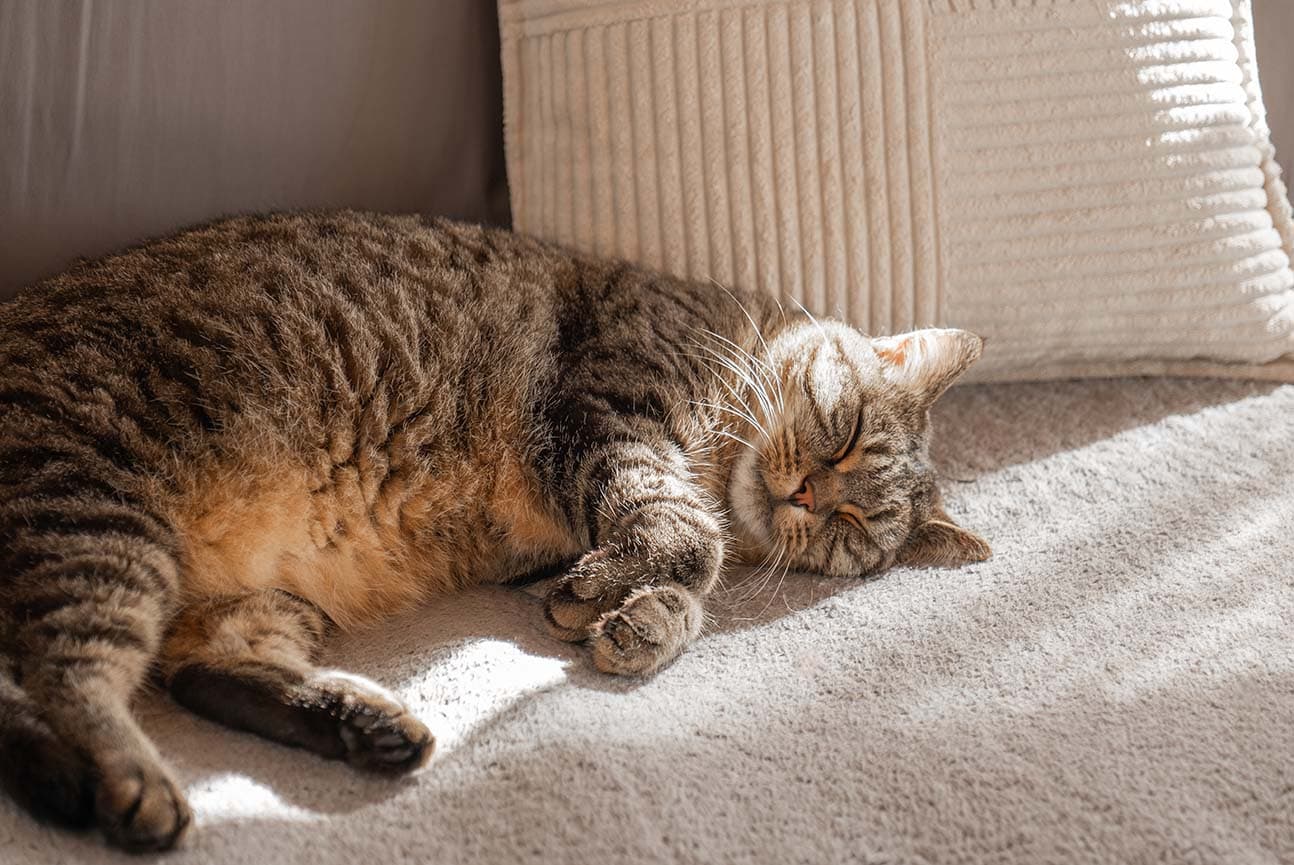Reviewed by Dr. Ionut Rusu
Updated on 15/10/2025
Reading time 4 min.
Overview
Severity: Low
Life stage: All
In Dubai, where the heat often keeps people and pets indoors, cats end up less active than they should be, which can easily lead to weight gain. Obesity is defined as when a cat carries 30% or more above its ideal body weight. It is a common issue worldwide and is becoming increasingly prevalent. This condition affects not only their health but also their overall quality of life, making it essential for UAE pet owners to understand and address it.
What is obesity in cats?
Obesity occurs when cats carry excess body fat. When your cat consumes more calories than they burn through daily activities and exercise, the excess energy gets stored as fat. Carrying excess fat can create serious problems throughout the body. It can potentially trigger serious health conditions, including diabetes, arthritis, heart disease, and urinary problems.
Why does obesity happen in cats?
Cat obesity is a complex condition influenced by multiple factors. Understanding these causes helps develop effective prevention and treatment strategies.
- Overfeeding or feeding ad lib
- Excessive treats, especially human food scraps
- Unsuitable or poor-quality food
- Lack of exercise
- Boredom or stress leading to overeating
- Medical conditions affecting mobility and metabolism
How can I tell if my cat is affected by obesity?
Recognising obesity in your cat requires careful observation, as weight gain often happens gradually. In Dubai’s indoor environment, subtle changes can be easily missed.
Physical signs to watch for
- Difficulty feeling your cat’s ribs
- Loss of a visible waist when viewed from above
- A rounded or sagging belly
- Fat deposits around the neck, legs, and base of the tail
- Matted fur due to difficulty reaching certain areas during grooming
Behavioural changes
- Reduced activity levels and increased sleeping
- Reluctance to jump onto furniture or climb cat trees
- Less interest in play or interactive toys
- Changes in grooming habits
What increases your cat’s likelihood of obesity?
Understanding the risk factors helps pet owners take appropriate preventive measures.
High-risk categories
- Indoor-only cats
- Neutered or spayed cats
- Middle-aged cats (5-10 years)
- Certain breeds, including Persian, British Shorthair, and Maine Coon
- Cats with previous weight issues
Dubai-specific risk factors
- Limited outdoor access due to extreme temperatures
- Sedentary lifestyle in air-conditioned environments
- Busy owner schedules leading to convenience feeding
- Multiple-cat households with competitive eating
Health complications of obesity in cats
Obesity significantly impacts your cat’s health and can lead to serious complications.
Health risks
- Diabetes mellitus
- Arthritis and joint pain
- Heart disease and high blood pressure
- Breathing difficulties
- Heat stress (particularly concerning in Dubai’s climate)
- Fatty liver syndrome (hepatic lipidosis)
- Urinary tract problems
Quality of life impacts
- Reduced life expectancy
- Reduced mobility and exercise tolerance
- Difficulty with personal hygiene
- Social withdrawal and behavioural changes
How can I tell if my cat is obese?
A veterinary assessment is important for diagnosis and to help with treatment. Many vets use standardised body condition scoring (BCS) systems to determine if a pet is under- or overweight (IMAGE).
Home assessment
- Rib check: Place your hands on your cat’s chest. You should easily feel the ribs without pressing hard
- Waist evaluation: Look down at your cat from above – there should be a visible waist behind the ribs
- Profile view: From the side, the belly should tuck up towards the hind legs
- Fat pad check: Feel for fat deposits around the neck, legs, and abdomen
When to seek professional help: If you suspect your cat is overweight, schedule a consultation with your vet. Professional assessment includes:
- Accurate weight measurement and tracking
- Body condition scoring
- Assessment for underlying medical conditions
- Nutritional counselling
- Exercise recommendations
Veterinary treatment for obesity in cats
Medical support
- Medical evaluation to rule out underlying conditions like diabetes
- Analysis of current diet and feeding practices
- Creating a personalised weight loss plan. This will be tailored to your cat’s specific needs and lifestyle
- Frequent check-ups to track progress and adjust plans
Prescription foods
- Promote steady weight loss whilst maintaining satiety
- Your vet will recommend the diet that’s best suited for your cat’s needs
Managing your cat’s weight at home
Home management is where the real work happens, and Dubai’s environment requires specific considerations.
Feeding
- Measure food precisely using kitchen scales
- Use puzzle feeders to slow eating and increase activity
- Avoid free-feeding – remove uneaten food after 20 minutes
- Limit treats to 10% of daily calories
Exercise
- Consider using cat trees and shelving for vertical climbing
- Introduce interactive toys like feather wands and laser pointers
- Ensure adequate physical and mental stimulation
Dubai-specific considerations
- Maximise use of cooler morning and evening hours for activity
- Create cool play areas with tiles or cooling mats
Record keeping
- Monitor changes in activity levels
- Take regular photos to track body condition changes
Protecting your cat against obesity
It’s always easier to prevent obesity than to treat it, especially in Dubai, where the climate makes regular exercise a challenge for pets.
Feeding
- Choose a diet suitable for their age and lifestyle
- Maintain consistency with feeding times and portions
- Replace free-feeding with 2-3 measured meals daily
- Weigh your cat monthly and track changes
Exercise
- Ensure consistent physical and mental stimulation
Life stage considerations
- Kittens: Establish healthy eating and exercise patterns early
- Adults: Monitor weight closely during peak risk years (5-10 years)
- Senior cats: Adjust diet and exercise as metabolism and activity levels change
Multi-cat household management
- Feed cats separately to prevent overeating
- Provide multiple feeding stations and exercise opportunities
- Consider different diets for cats with varying needs
Emergency signs requiring immediate veterinary attention
While obesity develops gradually, certain symptoms require urgent care:
Immediate veterinary attention needed:
- Difficulty breathing or open-mouth breathing
- Collapse or inability to stand
- Refusal to eat for more than 24 hours (risk of fatty liver syndrome)
- Extreme lethargy or unresponsiveness
- Signs of heat stroke
- Difficulty urinating or straining in the litter box
Dubai emergencies: The extreme climate can exacerbate obesity-related problems. Heat stress is particularly dangerous for overweight cats. Immediate veterinary care is essential if your cat shows signs of overheating, including excessive panting, drooling, or weakness. Modern Vet Hospital has excellent 24-hour veterinary facilities, don’t hesitate to seek help if you’re concerned about your cat’s condition.
Worried your cat may be overweight? Book a checkup today at Modern Vet Hospital in Dubai. Our experienced team can assess your cat’s weight, provide tailored nutrition and exercise plans, and monitor their progress safely. From routine check-ups to long-term weight management, Modern Vet Hospital is here to support your cat’s health with expert, compassionate care.
Share this, choose your platform!
Reviewed by
Dr. Ionut Rusu
USAMV, RCVS
Dr. Ionut Rusu is a senior veterinarian with nearly a decade of successful experience in the field. He graduated in 2014 from the University of Agricultural Sciences and Veterinary Medicine (USAMV)…


